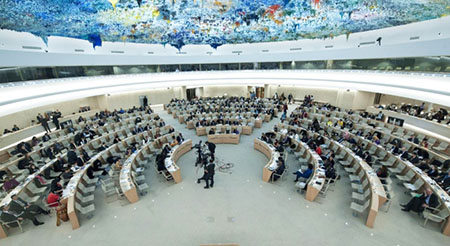Special to WorldTribune.com
 By John J. Metzler, October 20, 2023
By John J. Metzler, October 20, 2023
Over the past year human rights abuses in places ranging from Afghanistan to Ukraine, and to Myanmar/Burma, Xinjiang China, the Middle East, to name a few sordid cases, have splashed across the headlines.
Just in the past month, ethnic cleansing of Christian Armenians from Muslim Azerbaijan, and the loathsome Hamas terrorist attacks on the Jewish State of Israel, have stunned our sensitivities and shocked our humanity.
Human Rights violations abound from North Korea to the Middle East and Central Africa.
Clearly, now more than ever the world needs an effective and focused Human Rights Council;
But do we have one?
Instead, there’s a deeply flawed body hamstrung and dominated by authoritarian governments. The Council’s work and reports are often blocked or influenced by rogue regimes.

Recently the UN General Assembly held its annual elections, or selections via closed slates, of largely unopposed countries to fill vacancies on the 47 member Geneva-based Council.
During this ritual the full Assembly of 193 picks from various geographic groups who presented their candidates for election, or affirmation from usually preselected lists.
New York’s respected Human Rights Foundation (HRF) stated, “We call upon member states to refrain from voting in favor of Russia, China, Cuba, Burundi, and Kuwait. These candidates’ records, on respecting human rights at home and in UN voting, fail to meet the UN criteria for Council membership.”
Africa. There were four vacant seats filled by Burundi, Cote d’ Ivoire (Ivory Coast), Ghana and Malawi. Burundi stands out as one of the African continent’s most repressive societies. According to the human rights monitor Freedom House, who employs a comparative methodology data, Burundi scored a combined total of 14 out of 100 for civil and political rights. That’s just slightly above Sudan. The three other choices rank much better as partly free with Malawi at 66 and Ghana standing at 80.
Asia-Pacific. Here again four vacant seats filled by four pre-selected candidates. China, Indonesia, Japan and Kuwait won places. The People’s Republic of China needs no introduction; It’s the world’s largest dictatorship with a score of 9. Contrast that with the Republic of China on Taiwan whose 94 ranks as among Asia’s freest! The only consolation is that China gained 154 votes, the lowest in the group while Indonesia garnered 186, the highest. In other words, almost forty UN members refused to back Beijing despite the unopposed ballot and doubtless coercion.
Japan one of Asia’s notable democracies with a score of 96, Indonesia with 58, and Kuwait standing at 37 were equally chosen.
Eastern Europe. Three states contested two seats; Russia was back in the running but lost its bid with a dismal vote count of 83. Albania and Bulgaria won; Albania’s standing is 67 of partly free while Bulgaria rates at 79. Russia’s freedom score is a mere 16 making the country Not Free. Moscow’s setback is significant as Russia often served on the Council but has been diplomatically shunned since its Ukraine invasion. Actually, Russia held the seat but given Moscow’s appalling human rights record and its war in Ukraine, the General Assembly expelled Russia from the Council in 2022. The Czech Republic replaced Russia.
Latin America & Caribbean. Here we saw four countries selected for three seats: Brazil, Cuba, and Dominican Republic. Peru lost the race with a mere 108 votes. Yet communist Cuba got back on the Council with 146 votes, to Brazil’s 144, and 137 for the Dominican Republic.
Cuba’s regime needs no introduction, the country gets a mere 12 ranking for political and civil rights. Yet, Havana edged out Brazil for the top tally. Brazil remains Free with a 72 while the Dominican Republic rates 68.
Western Europe. No contest or worry here with two countries vying for two seats: France and Kingdom of the Netherlands. The Netherlands won 169 votes, scoring 97 in the Freedom ratings while France with 153 votes rates 89.
The new members join the Council in January 2024 for three-year terms.
Sitting in Geneva, Switzerland on a beautiful leafy UN campus, the Council stands literally a world away from forgotten and besieged villages in Ukraine, Burma, Sudan or Syria where heinous violations of human and civil rights often continue unabated. There’s a stark metaphysical gap between wealthy Geneva and what transpires in communist states such as North Korea or China or thuggish regimes globally.
The Council, with its near majority of authoritarian regimes, ironically reflects today’s world more than we may wish to realize. It’s increasingly difficult for outnumbered democracies to push back.
John J. Metzler is a United Nations correspondent covering diplomatic and defense issues. He is the author of Divided Dynamism the Diplomacy of Separated Nations: Germany, Korea, China (2014). [See pre-2011 Archives]
